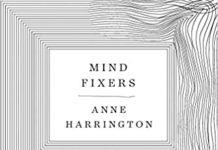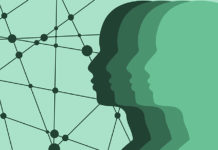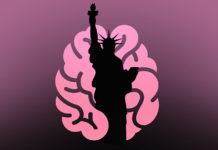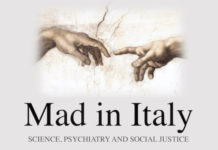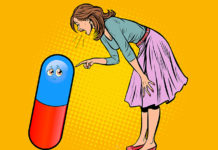An “Even-Handed” History of Psychiatry as Damning as the “Polemics”?
Where Professor Harrington's book seems to differ from books that others might call polemics is that she does not attribute nefarious motives to the psychiatric establishment. I worry that she underplays the ways in which the current model causes harm, but I support her suggestion for a retraction of psychiatry's scope.
We Lost a Giant Today: A Tribute to Janet Foner
Janet Foner, a longtime mental health liberation activist, passed away on July 24, 2019. Many people do not know that Janet helped form the very early Alternatives Conferences in the U.S. and she co-founded MindFreedom International and continued serving on its board to this day. Here we honor her wisdom, tenacity and courage.
Responding to “The Case Against AOT”—Next Steps for Change
Many will direct their efforts toward repealing involuntary outpatient commitment statutes in their states—an extremely challenging and uphill battle—or reforming abuses. Their arguments will be strengthened immensely by the findings in MIA's report. What follows are suggestions about what kinds of interventions to consider.
The Chemical Imbalance Theory: Dr. Pies Returns, Again
Psychiatrist Ronald Pies published a recent piece in the Psychiatric Times titled "Debunking the Two Chemical Imbalance Myths, Again." The subtitle: "A little learning is a dangerous thing." And indeed it is. But not nearly as dangerous as a psychiatrist with a head full of spurious diagnoses and a ready prescription pad.
U.S. Politicians Now “Trauma Informed”—Should We Be Hopeful?
It is good that the general public is finally hearing about the ACE Study, but I do not count on U.S. politicians to address the core implications of the ACE findings—the need to re-make U.S. society so as to (1) prevent preventable adverse childhood experiences, and (2) create a society in which healing from trauma can more easily occur.
An Open Letter to Howard Stern, the “Poster Boy for Psychotherapy”
Dear Howard Stern: What may come as a surprise to you is that the quality of talk therapy that was available to you—time-intensive, in-depth sharing of feelings, exploring childhood traumas, examining and changing difficult personality traits—is steadily becoming unavailable to the average American.
End Kendra’s Law Now: Racist, Classist Practices in Involuntary Psychiatry Persist
In addition to involuntary outpatient commitment being an assault on and targeting people who are living in or near poverty, the statistics demonstrate racial disparities in the application of involuntary outpatient commitment.
Talking About Psych Diagnoses and Drugs: A Primer for Parents & Professionals
It is important to tell parents the truth about what can and cannot be known about their child. In this way, people come to appreciate that labels and treatments offered by psychiatric professionals are far from being grounded in hard science.
System Change Toward a Green Movement in Mental Health
As a counter narrative, I believe that understanding system change and reform in mental health with a "green" lens makes use of a powerful theme which is increasingly accepted — and it lays out a road map to make innovative programs and initiatives the new norm for system-wide responses to mental health challenges.
Equal Legal Capacity or ‘Supported Decision-Making’?
At a recent conference on legal capacity, I was struck by the failure of another invited expert to adhere to the paradigm of supported decision-making as articulated by the CRPD Committee. We still need to work to ensure that this paradigm is well understood and appreciated, despite the progress made in national reforms.
On Cognitive Liberty: A Principle to Rally Behind
The concept of cognitive liberty is valuable—one might even say necessary—precisely because it goes to the core of what we are as human beings. Correspondingly, it unmasks psychiatry for the profound human rights violator that it is. It reveals such transgression as the essence of what psychiatry is actually all about.
Being-Towards-Suicide
Is it not the very capacity for suicide that makes us human? This capacity, this freedom, of autonomy’s jurisdiction to extend to the outermost seconds of life, namely death, is an innate part of humanity and thus consciousness. Accepting death as a possibility embraces the finitude of our existence.
Why Mad in Italy?
The Italian mental health system, like the majority of them around the world, struggles with accepting a model based on principles of Recovery, which highlights individual and communal mental health needs, social determinants of emotional distress, integration of physical and psychological care and quality of life.
Inside an Online Charter School: Labeling Kids “Disabled” for Profit
I’d thought this teaching job would be my chance to make positive changes in children’s lives. But most of the recommendations in students' IEPs were related not to reading, writing, and ’rithmetic but to behavior control and obedience to adults. And the school seemed to be working very hard to prove that the kids were disabled and to get them certified as such.
A Guide to Long-Acting Neuroleptics: Education or Promotion?
The National Council for Behavioral Health has released a new pamphlet titled “Guide to Long-Acting Medications for Providers and Organizations.” By downplaying some aspects of the available science, the pamphlet implicitly acts as a promotional tool for the pharmaceutical industry.
The Pill Shaming Phenomenon: What’s It Really About?
At best, the underpinnings of the ‘pill shaming’ accusation are misguided. At worst, they represent a concerted effort on the part of the current power structure to use us against ourselves (and they don’t need any more help). It’s the same old story packaged up as if it were something new and ultra woke.
The Voices My Daughter Hears
The voices were extraordinary; in a way, they were like ghosts. I could not see them, but only divine them by the turmoil they stirred up in Annie. They were not polite house ghosts who knew when to leave; they were ne’er-do-wells she could not get rid of. They were tormentors and torturers, testing the limits of her sanity, blackmailing her into submission.
Madness, Sexuality and Legacies of Strategic Sanism
There has been little engagement between the survivor and LGBT movements despite a shared interest in critiquing and resisting the normalization project of the psy disciplines — that is, psychiatry and psychology’s clinical categorization of what is ‘normal’ and ‘abnormal’ or ‘healthy’ and ‘sick’. Why might this be?
Introducing Voices for Choices
Between my first involuntary psychiatric commitment and my learning that the consumer/survivor/ex-patient movement existed, I spent years unnecessarily stumbling along on my own. The Voices for Choices video series was conceived to help connect those in need to the existing movements and resources available to us.
“Three Identical Strangers” and the Nature-Nurture Debate
Three Identical Strangers is a riveting film describing the story of identical triplets separated at six months of age and reunited in early adulthood. Their story provides no evidence in support of the genetic side of the nature-nurture debate, but it does supply some evidence in favor of the environment.
To Warn or Not to Warn? A Critique of MIA’s Use of Diagnostic Terminology
I have concerns about how Mad In America deals with diagnostic terminology. When psychiatric diagnoses are used without signaling that they are constructs and unscientific, I feel alarmed for those who will be strengthened in their mistaken beliefs about the labels.
Tom Paine, Christianity, and Modern Psychiatry
Early in The Age of Reason, Thomas Paine attacks the hypocrisy of religious professionals. If alive today, Paine may well have been even rougher on psychiatrists. He revered science, and he would have been enraged by professionals who make pseudoscientific proclamations.
ECT Litigation Update: Are Patients Being Warned of Brain Damage Risk?
Upon review of hundreds of the "informed" consent forms received from those suffering permanent cognitive impairment after receiving ECT, the overwhelming majority do not provide the patient with any form of disclosure that "brain damage is a risk that can potentially occur from ECT, whether performed properly or not."
Two Years Tapering an Antidepressant – A Life-Changing Experience That I Didn’t Want
My heart goes out to anyone experiencing withdrawal, but especially those who are so ill they can’t work and are struggling to navigate a heartless and cynical ‘benefits’ system. Their only crime is to have experienced difficulty from a prescribed treatment, yet they are treated as medical pariahs.
The Three Types of Psychiatric Drugs – A Doctor’s Guide for Consumers
Psychiatrists say little in their brief sessions. But if you take the few things they do say, read between the lies and boil them down to their essence, you’ll be left with this message: “Whatever is upsetting you is not worth listening to — just shut up and take one of these shut-up pills.”

